- There are no more items in your cart
- Shipping Calculated at checkout
-
Sub-Total (inc. VAT)
£0.00
Need Help?
Adhesion Primers
Specialist adhesion primers for metal are designed to improve the adhesion of paint and coatings on metal surfaces. They act as a bonding primer, ensuring that topcoats adhere effectively to metal substrates, especially challenging surfaces like galvanised steel or aluminium. These primers are essential for industrial, commercial, and automotive applications, where long-lasting protection and durability are critical. Adhesion-promoting primers offer corrosion resistance, prevent peeling, and ensure a smooth finish. Suitable for use in sectors such as manufacturing, construction, and transportation, these high-adhesion primers are vital for successful metal coating projects.
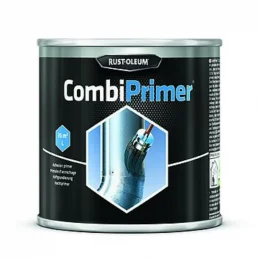
Rust-Oleum 3302 CombiPrimer Adhesion Primer
Available in a transparent blue finish. Highly effective adhesion primer for ensuring smooth surfaces are coatable. For galvanised steel, stainless steel, aluminium, copper, glass, and porcelain. High coverage of 50 m²/L. Recoatable after just 30 minutes.
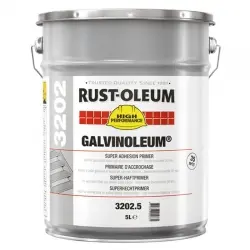
Rust-Oleum 3202 Galvinoleum Primer
Available in translucent blue. Primer for galvanised steel, plastics, and other smooth surfaces. Recoatable after just 30 minutes, providing a high coverage of 50 m²/l. Offers excellent adhesion.
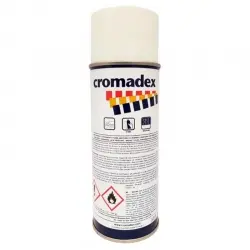
Cromadex Acid Etch Primer Aerosol
Cromadex Acid Etch Primer Aerosol is a high quality fast dry spraying primer, offering excellent adhesion on many difficult to coat substrates, including aluminium, alloy, stainless steel and zintec. Contains active rust prevention pigments Very fast drying Can be overcoated with most Cromadex topcoats More Information Delivery Info
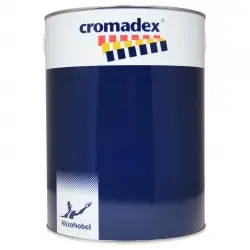
Cromadex 903 Two Pack Chromate-Free Etch Primer
Cromadex 903 Two Pack Chromate-Free Etch Primer is a two pack chromate-free etch primer designed for use over a wide range of substrates. It is formulated without the use of zinc tetroxy-chromate helping to reduce health and safety concerns. Cromadex 903 should be used to improve adhesion and corrosion resistance of all systems used over metal...
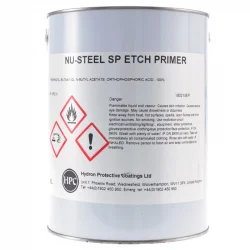
Hydron Nu-Steel SP Etch Primer
Nu-Steel SP Etch Primer is a single pack primer giving excellent adhesion to aluminium and other metal prior to subsequent paint systems. First coat of the Nu-Steel System Provides first class adhesion to properly prepared surfaces
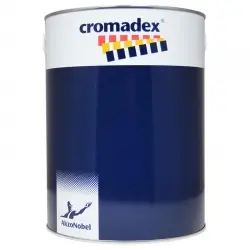
Cromadex 902 One Pack Etch Primer
Cromadex 902 One Pack Etch Primer is a one pack etch primer that can be both air dried and stoved making it suitable for use in most paint shops. The product has enhanced adhesion properties to mild steel ensuring the success of the coating system. Cromadex 902 is available in white, grey and black. More Information Delivery Info
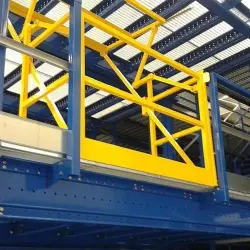
International Interprime 539
International Interprime 539 is a single component modified polyvinyl butyral, phosphoric acid etch primer free from zinc chromate. Intended for use as a pretreatment primer designed to promote adhesion and seal the surface of non-ferrous metals such as aluminium, copper, brass, cadmium, zinc and nickel.
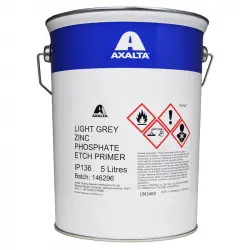
Axalta Stokes Etch Primer Chromate-Free
Axalta Stokes Etch Primer Chromate-Free is a single pack pvb etch primer, chromate-free, for steel and non-ferrous metals. Formulated to be free from zinc chromate to EU Legislation 2007 Use as an adhesion promoter for degreased galvanising, aluminium, copper, brass, nickel, and cadmium Also suitable for aluminium cladding, galvanised...
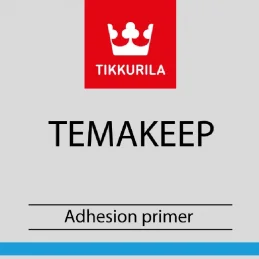
Tikkurila Temakeep
Tikkurila Temakeep is a two-component adhesion primer based on epoxy resin, used on cold-rolled steel, stainless steel, aluminium, zinc, epoxy and polyurethane surfaces as an adhesion primer before the primary paint system. For surfaces exposed to climatic conditions, gases or splashes Can be overcoated with an extensive range of topcoats...
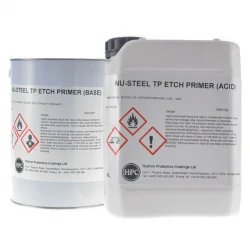
Hydron Nu-Steel TP Etch Primer
Nu-Steel TP Etch Primer is a two pack primer giving excellent adhesion to aluminium and other metal prior to subsequent paint systems. High performance product giving protection up to 8 years For use on properly prepared steel such as parapet/guard rails and architectural steelwork. Part of the part of the Nu-Steel TP System More...
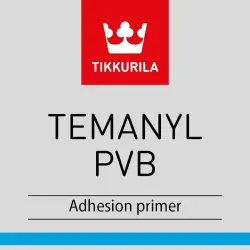
Tikkurila Temanyl PVB
Tikkurila Temanyl PVB is a one-component, polyvinyl-butyral adhesion primer. Adheres extremely well to different kinds of surfaces, such as steel, zinc, aluminium and stainless steel. The primer ensures the durability of the whole painting system. A very fast-drying adhesion primer, which saves time during the application process....
Need Help?
Need Help?
Adhesion primers for metal are advanced coating solutions designed to facilitate the bonding of paint and coatings to metal substrates. Metal, by its very nature, poses a unique set of challenges when it comes to painting or coating due to its non-porous, smooth surface. Without the correct preparation, paint will have difficulty adhering, leading to peeling, flaking, or early failure of the coating system. Adhesion-promoting primers, also known as bonding primers or high-adhesion primers, solve this problem by creating a chemical bond between the metal surface and the topcoat.
Metal adhesion primers are essential for numerous industries, including automotive, construction, industrial manufacturing, and aerospace. These primers provide not only superior adhesion but often come with additional benefits such as corrosion resistance, fast drying times, and compatibility with a wide range of metals. Their use ensures that metal surfaces are properly prepared, improving the lifespan and durability of the topcoats applied over them.
Key Applications and Market Sectors
Adhesion primers for metal are essential across a broad spectrum of industries, providing crucial protection and enhancing the longevity of metal surfaces. These primers are used in sectors where metal components play a pivotal role in the structural integrity, aesthetics, and overall functionality of a project or product.
Automotive Industry
The automotive sector is one of the largest consumers of metal adhesion primers. Vehicles are made from a wide array of metals, including steel, aluminium, and alloys, all of which require protective coatings to prevent corrosion, enhance durability, and improve visual appeal. Adhesion primers in the automotive industry are used at multiple stages, from the production of vehicle bodies to aftermarket refinishing.
- Car Bodies and Frames: Modern vehicles are largely made of steel and aluminium. These metals need to be coated to prevent corrosion and ensure the paintwork remains intact throughout the life of the vehicle. High-adhesion primers are critical for ensuring that the paint layers adhere properly to the metal substrates, protecting them from moisture, road salts, and other environmental factors.
- Alloy Wheels: Aluminium and magnesium alloy wheels are standard in modern cars due to their lightweight and strength. However, these metals can corrode without proper treatment. An adhesion-promoting primer helps to ensure the topcoat sticks securely to the wheel’s surface, preventing chipping, peeling, and corrosion caused by road debris, moisture, and chemical exposure from de-icing salts.
- Engine Components and Chassis Parts: Many internal components of a vehicle, including the engine block, exhaust system, and chassis, are made from various metals that experience extreme temperatures and environmental exposure. Adhesion primers designed for these applications not only promote paint adhesion but also provide additional thermal resistance and durability, ensuring that these critical parts remain operational and corrosion-free for as long as possible.
- Automotive Refinishing and Repairs: When vehicles require repainting after damage, an adhesion primer is vital for bonding new paint layers to the repaired areas, especially on metals like aluminium, which are difficult to coat without proper preparation. Adhesion primers ensure a smooth, lasting finish in automotive body shops, preventing premature paint failure.
Construction and Architecture
In the construction and architectural sectors, metal adhesion primers are used to protect the structural integrity and longevity of buildings and infrastructure. Metal components in construction are constantly exposed to the elements, making corrosion and wear major concerns. Adhesion primers are key to safeguarding these materials, extending their lifespan, and ensuring that topcoats remain intact and effective.
- Steel Frameworks: Steel is a common material in modern building structures due to its strength and versatility. However, untreated steel is highly susceptible to rust and corrosion when exposed to moisture and air. A high-adhesion primer helps the protective coatings bond with the steel surface, sealing it from environmental exposure and ensuring the structure remains robust for years.
- Galvanised Steel in Exterior Cladding: Exterior architectural elements, such as cladding, facades, and roofing, are often made from galvanised steel. This material is durable and resistant to corrosion, but still requires a protective coating to maintain its appearance and function. Adhesion primers formulated for galvanised steel are essential in ensuring that the topcoats adhere properly, preventing peeling or flaking in outdoor conditions.
- Aluminium Windows and Curtain Wall Systems: Aluminium is widely used in windows, doors, and curtain walls for its light weight and resistance to corrosion. However, like steel, it has a smooth surface that requires an adhesion primer for paint or coatings to bond effectively. Adhesion-promoting primers ensure that the architectural finishes applied to these elements remain intact, protecting against UV exposure, moisture, and physical damage.
- Decorative Metalwork: Many architectural designs feature decorative metal elements such as railings, balustrades, and gates. These features not only contribute to the overall aesthetics of a building but also need protection from corrosion and wear. Adhesion primers provide a solid foundation for paints and finishes, preserving the metal’s appearance and preventing rust.
- Bridges and Infrastructure: Metal adhesion primers are crucial in the maintenance and protection of large infrastructure projects such as bridges, pipelines, and transportation structures. Steel used in these projects is exposed to extreme weather conditions and heavy use, and corrosion could lead to structural failures. A corrosion-resistant primer enhances the bonding of protective coatings, ensuring that these critical structures remain safe and functional for decades.
Industrial Manufacturing
The industrial sector relies heavily on metals for machinery, equipment, and storage solutions. Adhesion primers play a vital role in ensuring that these metals remain protected from environmental and chemical damage, especially in settings where they are exposed to harsh operating conditions.
- Machinery and Equipment: Manufacturing machinery is often constructed from steel, aluminium, or other metals. These machines are subject to wear and tear from constant use, as well as exposure to oils, lubricants, and chemicals. A high-adhesion primer ensures that protective coatings adhere to the metal surfaces, preventing corrosion and extending the equipment’s operational life.
- Pipelines and Storage Tanks: Industrial sites often use metal pipelines and storage tanks to transport and hold liquids and gases. These structures are frequently exposed to chemicals, extreme temperatures, and moisture, all of which can degrade metal surfaces over time. Adhesion primers create a barrier between the metal and the environment, enhancing the performance of anti-corrosion coatings and ensuring long-term protection.
- Metal Fabrication: In metal fabrication, adhesion primers are used to ensure that painted or coated metal parts bond securely with their protective layers. Whether the finished product is machinery, tools, or other metal components, a bonding primer helps prevent surface degradation and ensures that the coatings withstand physical stresses during use.
- Food Processing and Pharmaceutical Plants: Metal adhesion primers are particularly important in industries where cleanliness and hygiene are paramount, such as food processing and pharmaceutical manufacturing. In these environments, metals are often exposed to cleaning chemicals, moisture, and varying temperatures. A high-adhesion primer ensures that protective coatings adhere properly to stainless steel, aluminium, and other metal surfaces, providing resistance to chemicals and ensuring easy cleaning.
Aerospace Industry
The aerospace industry demands the highest levels of precision and reliability, especially in protecting metal surfaces from the unique environmental stresses encountered in flight. Adhesion primers are critical in ensuring that protective coatings used in aircraft construction remain intact under extreme conditions.
- Aircraft Fuselages and Wings: Aircraft bodies are made from lightweight metals such as aluminium and titanium, which need protective coatings to guard against corrosion from moisture, salt in the air, and UV radiation. Adhesion primers are necessary to create a strong bond between these metals and the topcoat, preventing paint from peeling due to the high-speed airflow over the surfaces.
- Aircraft Interiors and Components: Inside an aircraft, metals are exposed to temperature changes and wear from passenger use. Adhesion primers are used on metal parts such as seating structures, overhead compartments, and galleys to ensure coatings adhere well and provide durable finishes that stand up to repeated use.
- Heat-Resistant Coatings for Engines: Aircraft engines and related components are exposed to extremely high temperatures during flight. Metals such as steel and titanium must be coated with heat-resistant coatings, and these coatings require an adhesion primer to bond properly to the metal surface. Without a primer, the heat and stress could cause the coating to peel away, compromising the protection of critical components.
- Corrosion Protection in Harsh Environments: Aircraft components, especially those in military or coastal operations, are frequently exposed to harsh environments that accelerate corrosion. Adhesion primers with corrosion-resistant properties ensure that protective coatings remain securely bonded to metal surfaces, reducing maintenance costs and extending the lifespan of aircraft.
Marine Applications
In marine environments, metals are constantly exposed to saltwater, which accelerates the corrosion process. Adhesion primers are a critical component of any marine coating system, ensuring that metals used in ships, docks, and offshore structures are protected from the harsh, corrosive marine environment.
- Ship Hulls: Steel and aluminium are commonly used in the construction of ship hulls. However, without proper priming and coating, these metals will quickly corrode when exposed to saltwater. Adhesion primers ensure that marine-grade paints and protective coatings adhere to the metal surfaces, providing a first line of defence against corrosion.
- Offshore Platforms and Oil Rigs: Offshore oil rigs and platforms face extreme weather conditions and constant exposure to saltwater. The metals used in their construction, such as steel, require adhesion primers to ensure that the protective coatings can withstand the corrosive marine environment. These primers help protect against rust, ensuring that the structural integrity of the platforms is maintained.
- Docks, Piers, and Marine Infrastructure: Metal structures in marinas, such as docks, gangways, and moorings, are often constructed from galvanised steel or aluminium. These metals are highly exposed to both saltwater and physical wear from boats and equipment. Adhesion primers ensure that protective coatings adhere securely, preventing corrosion and prolonging the lifespan of these structures.
- Marine Equipment: Boats and ships are equipped with various metal components, such as masts, anchors, and rigging, which are constantly exposed to moisture and saltwater. Using an adhesion-promoting primer on these metal parts ensures that the applied coatings resist corrosion, rust, and physical wear, reducing maintenance needs and extending the life of marine equipment.
Key Features of Adhesion Promoting Primers for Metal
Metal adhesion primers offer a range of features that make them indispensable for professionals across various industries. Some of the most critical features that should be considered when selecting an adhesion-promoting primer include:
- Exceptional Adhesion Performance: A metal adhesion primer must offer superior bonding capability, ensuring the paint or coating remains securely attached to the metal surface. This is achieved through chemical reactions that occur between the primer and the metal substrate, which "lock" the coating onto the surface. This feature is essential for metals like aluminium and stainless steel, which are notoriously difficult for paints to adhere to without proper priming.
- Corrosion Resistance: One of the primary reasons for applying an adhesion primer to metal is to prevent corrosion. Many high-adhesion primers are formulated with corrosion inhibitors, which protect the metal from rust and degradation. This feature is particularly important for metals exposed to moisture, such as in construction, marine, or industrial applications. Corrosion resistance ensures that the metal remains structurally sound, extending the life of both the metal and the coating.
For example, in bridge construction, steel components are often exposed to rain and humidity, which would lead to rust without a protective primer. A corrosion-resistant bonding primer ensures that the steel remains rust-free and structurally sound for decades. - Wide Compatibility with Metal Types: Metal adhesion primers are formulated to work with various metals, including galvanised steel, aluminium, copper, zinc, and alloys. This makes them versatile for use in different projects where multiple metal types are involved. For example, a construction project might involve both galvanised steel beams and aluminium window frames—both of which require a primer that can adhere effectively to different substrates.
- Fast Drying and Overcoating Time: In many industrial and commercial applications, time is a critical factor. Fast-drying adhesion primers allow for quicker overcoating, enabling the entire painting or coating process to be completed in less time. This is particularly useful in manufacturing plants, automotive body shops, and construction sites, where delays can result in increased costs.
A fast-drying adhesion primer, for example, allows an automotive assembly line to continue without delays, ensuring that painted parts can move quickly through the production process without the need for extended drying times. - Chemical Resistance: Many adhesion primers are formulated to resist chemicals, solvents, and acids, making them ideal for industrial environments where metals are exposed to aggressive substances. For instance, in a chemical processing plant, pipelines and metal tanks often come into contact with harsh chemicals that could corrode unprotected metals. An adhesion primer with chemical resistance ensures that the coating remains intact, protecting the metal surface beneath.
- Thermal Stability: Metal components exposed to high temperatures, such as those used in power plants, furnaces, or industrial machinery, require a primer that can withstand thermal stress. Adhesion primers with thermal stability ensure that the paint or coating remains adhered to the metal surface, even in extreme temperature conditions.
This feature is vital in industries like aerospace, where aircraft components are exposed to both high and low temperatures during flight, or in industrial settings where machinery is subjected to heat from constant operation. - Abrasion and Impact Resistance: In many industrial and construction settings, metal surfaces are subject to physical wear and tear, including impacts and abrasions. Adhesion primers designed with abrasion resistance ensure that the protective coating system remains intact, even in environments where metal surfaces experience frequent contact with tools, equipment, or heavy objects.
For example, metal surfaces in manufacturing plants or on construction sites can be easily damaged if not protected by a durable coating system. An adhesion primer that offers resistance to abrasion ensures that the underlying metal remains undamaged and the coating remains effective.
Common Metal Surfaces and Why Adhesion Primers Are Necessary
Metal surfaces vary widely in their properties and each presents its own challenges when it comes to achieving proper paint adhesion. Here are detailed examples of common metal surfaces and why adhesion primers are essential:
- Aluminium: This lightweight, corrosion-resistant metal is commonly used in automotive, aerospace, and architectural applications. However, aluminium has a naturally smooth and oxidised surface, which makes it difficult for paint to adhere without a proper primer. A high-adhesion primer chemically bonds to the aluminium surface, creating a stable base for the topcoat and ensuring long-term performance.
- Galvanised Steel: Galvanised steel is coated with a layer of zinc to prevent rust, but this zinc layer can interfere with the adhesion of paints and coatings. Without an adhesion-promoting primer, paint can easily flake off galvanised surfaces. A primer designed for galvanised steel ensures that the topcoat bonds securely, preventing issues such as peeling or delamination.
- Stainless Steel: Often used in industrial and architectural applications, stainless steel is resistant to rust but is also difficult to paint due to its smooth surface. An adhesion primer specifically formulated for stainless steel allows for proper bonding between the metal and the protective coating.
- Copper and Brass: These metals are commonly found in decorative applications, plumbing, and electrical components. Adhesion primers are essential for preventing oxidation and ensuring that coatings or paints adhere properly, particularly in environments where copper or brass is exposed to moisture or chemicals.
- Mild Steel and Cast Iron: These heavy-duty metals are frequently used in industrial applications, including machinery, construction equipment, and structural components. Without proper priming, these metals are highly susceptible to rust. Adhesion primers ensure that protective coatings adhere well and provide long-term protection against corrosion.
By using specialist adhesion primers designed for these and other metals, manufacturers, builders, and maintenance teams can extend the life of their metal components, reducing the need for repairs and ensuring that paint and protective coatings remain effective for many years.
For specific product recommendations and compatibility guidance, contact Rawlin’s technical support team for advice on the best adhesion primer for your project.
